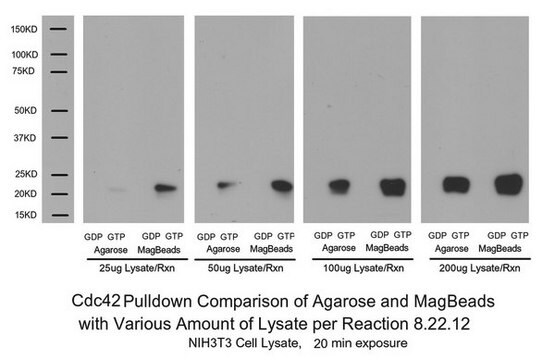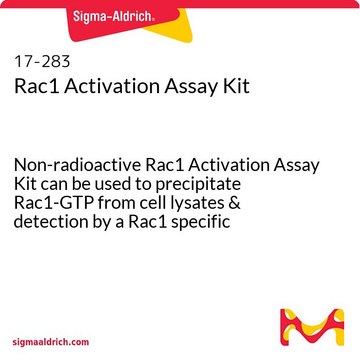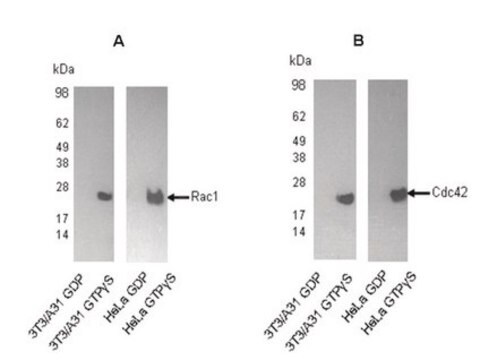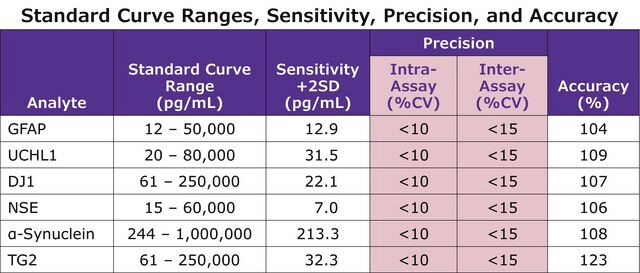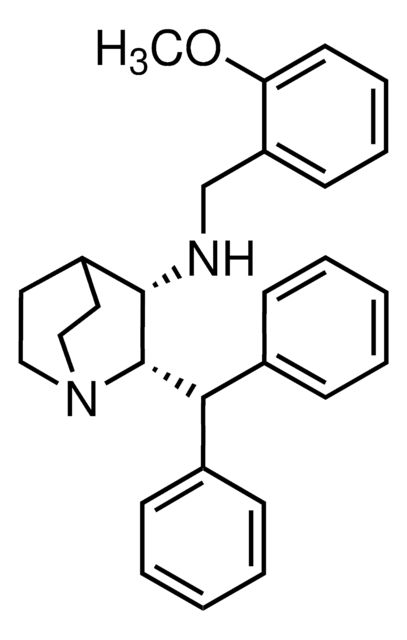17-10393
Rac1 Activation Magnetic Beads Pulldown Assay
Non-radioactive Rac1 Activation Assay Kit can be used to precipitate Rac1-GTP from cell lysates, & detection by a Rac1 specific monoclonal antibody.
Sign Into View Organizational & Contract Pricing
All Photos(1)
About This Item
UNSPSC Code:
12161503
eCl@ss:
32161000
NACRES:
NA.84
Recommended Products
Quality Level
species reactivity
rat, mouse, human
manufacturer/tradename
Upstate®
technique(s)
activity assay: suitable (G-protein activation)
affinity binding assay: suitable
NCBI accession no.
UniProt accession no.
shipped in
dry ice
Gene Information
human ... RAC1(5879)
Specificity
Predicted to cross-react with all mammalian species
Anti-Rac1, clone 23A8 (mouse monoclonal IgG2b): Human, mouse and rat, other species cross-reactivity unknown. Note: This antibody may be reused 3-5 times for immunoblot analysis. Add 0.05% sodium azide to the blocking buffer containing the diluted antibody. Do not use sodium azides with HRP
Anti-Rac1, clone 23A8 (mouse monoclonal IgG2b): Human, mouse and rat, other species cross-reactivity unknown. Note: This antibody may be reused 3-5 times for immunoblot analysis. Add 0.05% sodium azide to the blocking buffer containing the diluted antibody. Do not use sodium azides with HRP
Application
Non-radioactive Rac1 Activation Assay Kit can be used to precipitate Rac1-GTP from cell lysates, & detection by a Rac1 specific monoclonal antibody.
Research Category
Signaling
Signaling
Packaging
Kit capacity: 30 assays
Components
Rac1/Cdc42 Assay Reagent (Pak-1 PBD, Magnetic beads): 300 ug of Pak-1 PBD in 150 uL of glutathione magnetic beads, provided as a 50% beads slurry in PBS containing 50% glycerol for a final volume of 300 uL.
Anti-Rac1, clone 23A8: (Part No. 05-389) One vial containing 250 ug of purified IgG2akappa in 250 uL of storage buffer (0.1 M Tris-glycine, pH 7.4, 0.15 M NaCl, containing 0.05% sodium azide).
Mg2+ Lysis/Wash Buffer, 5X, (Part No. 20-168).Two vials, each vial contains 18 mL of 125 mM, HEPES, pH 7.5, 750 mM NaCl, 5% Igepal CA-630, 50mM MgCl2, 5 mM EDTA and 10% glycerol
100X GTPγS, 10mM (Cat.# 20-176) One vial containing 50 uL of 10 mM GTPγS, 100X stock, in sterile water. Non-hydrolyzable analog of GTP. Sufficient to label 5 mL of cell lysates
100X GDP, 100 mM, (Part No. 20-177). One vial containing 50 uL of 100 mM GDP, 100X stock, in sterile water. GDP, Guanosine 5’-Diphosphate, type I, for in vitro labeling of G-proteins in the inactive form. Sufficient to label 5ml of cell lysates.
Anti-Rac1, clone 23A8: (Part No. 05-389) One vial containing 250 ug of purified IgG2akappa in 250 uL of storage buffer (0.1 M Tris-glycine, pH 7.4, 0.15 M NaCl, containing 0.05% sodium azide).
Mg2+ Lysis/Wash Buffer, 5X, (Part No. 20-168).Two vials, each vial contains 18 mL of 125 mM, HEPES, pH 7.5, 750 mM NaCl, 5% Igepal CA-630, 50mM MgCl2, 5 mM EDTA and 10% glycerol
100X GTPγS, 10mM (Cat.# 20-176) One vial containing 50 uL of 10 mM GTPγS, 100X stock, in sterile water. Non-hydrolyzable analog of GTP. Sufficient to label 5 mL of cell lysates
100X GDP, 100 mM, (Part No. 20-177). One vial containing 50 uL of 100 mM GDP, 100X stock, in sterile water. GDP, Guanosine 5’-Diphosphate, type I, for in vitro labeling of G-proteins in the inactive form. Sufficient to label 5ml of cell lysates.
Quality
Routinely evaluated by precipitating Rac-GTP from 3T3 cell lysates that had been loaded with GTPγS. The precipitated Rac-GTP was detected by immunoblot analysis using anti-Rac.
Linkage
Replaces: SGT425
Legal Information
UPSTATE is a registered trademark of Merck KGaA, Darmstadt, Germany
Disclaimer
Unless otherwise stated in our catalog or other company documentation accompanying the product(s), our products are intended for research use only and are not to be used for any other purpose, which includes but is not limited to, unauthorized commercial uses, in vitro diagnostic uses, ex vivo or in vivo therapeutic uses or any type of consumption or application to humans or animals.
Signal Word
Danger
Hazard Statements
Precautionary Statements
Hazard Classifications
Aquatic Acute 1 - Aquatic Chronic 2 - Eye Dam. 1
Storage Class Code
10 - Combustible liquids
Certificates of Analysis (COA)
Search for Certificates of Analysis (COA) by entering the products Lot/Batch Number. Lot and Batch Numbers can be found on a product’s label following the words ‘Lot’ or ‘Batch’.
Already Own This Product?
Find documentation for the products that you have recently purchased in the Document Library.
Samuel J Atkinson et al.
EMBO reports, 19(7) (2018-05-26)
Integrin β3 is seen as a key anti-angiogenic target for cancer treatment due to its expression on neovasculature, but the role it plays in the process is complex; whether it is pro- or anti-angiogenic depends on the context in which
Kitti Szabo et al.
Cellular and molecular life sciences : CMLS, 79(2), 122-122 (2022-02-08)
Skeletal muscle demonstrates a high degree of regenerative capacity repeating the embryonic myogenic program under strict control. Rhabdomyosarcoma is the most common sarcoma in childhood and is characterized by impaired muscle differentiation. In this study, we observed that silencing the expression
Our team of scientists has experience in all areas of research including Life Science, Material Science, Chemical Synthesis, Chromatography, Analytical and many others.
Contact Technical Service